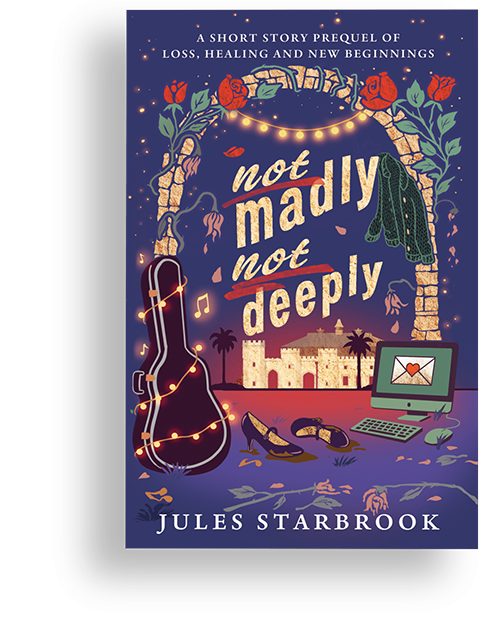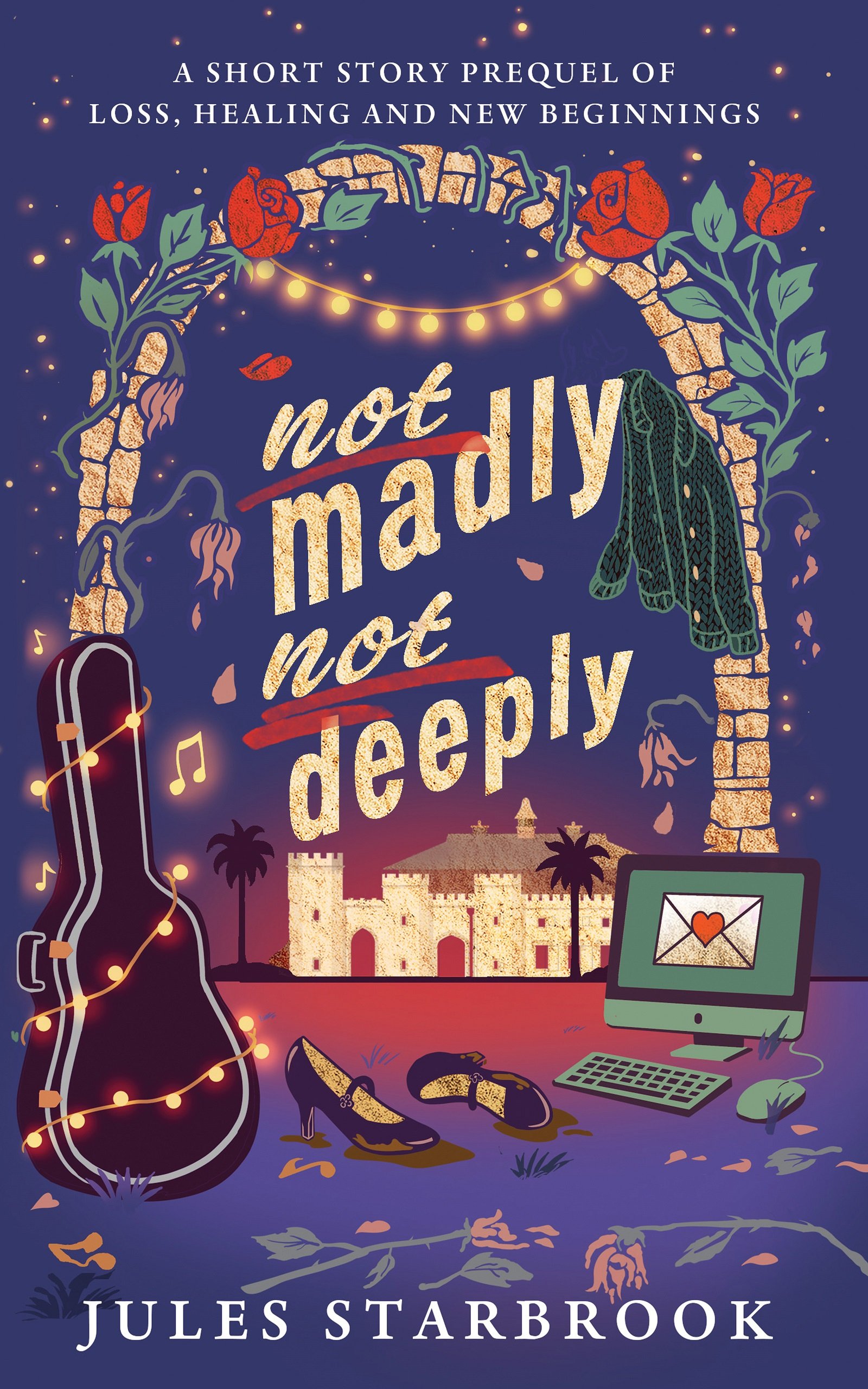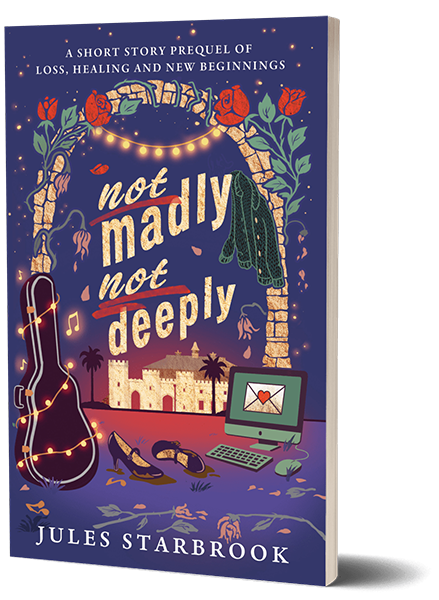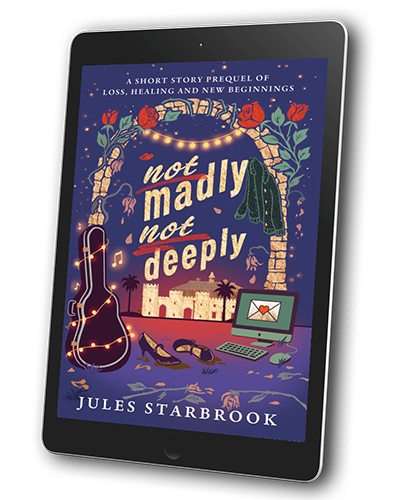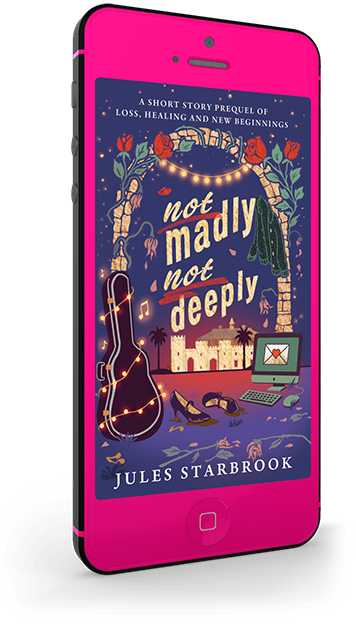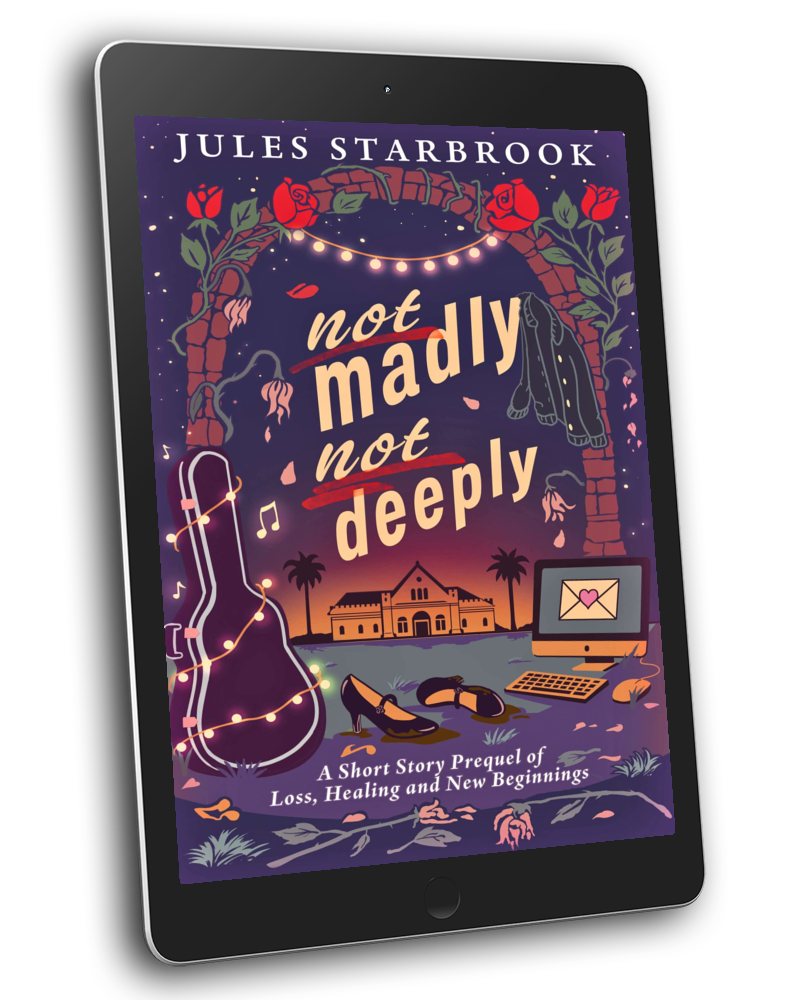Not Madly Not Deeply
The Short Story Prequel to Madly Deeply Always
🎁 Download for FREE when you sign up to my newsletter
💕 Also available as Ebook & Paperback on Amazon
📁 Click here to Download the Cover to share on social media!
Scroll Down to Read the Sample Chapter below!
She wore the wrong cardigan.
Said the wrong thing.
Played the wrong guitar.
But this time, Lily-Anne says NO—no to him, and no to his roses—and it might be the most right thing she’s ever done.
Still reeling from her dad’s death and a relationship that makes her feel small, Lily finally walks away, carrying only the guitar she can no longer bear to play.
With her confidence shattered and her grief still raw, she turns to the people she nearly pushed away: her mum, her sister, and the memory of her dad, who always supported her music.
Little does she know that someone is already out there—quiet, steady, and willing to believe in her—if she can only find the courage to reach out.
Could letting go of the wrong person be the first step to reigniting her spark—and opening the door to the kind of love she truly deserves?
Not Madly Not Deeply is a short story prequel offering a quiet, heartfelt glimpse into Lily’s journey of reclaiming herself.
While it can be read as a standalone, the story ends on a hopeful yet open note—setting the stage for the emotional healing, slow-burn romance, and eventual Happily Ever After to come in the full-length novel, Madly Deeply Always.
Women’s Fiction • Emotional journey • Short Story Prequel to full romance novel • Toxic ex • Finding your voice • Breaking free • Music and memory • Family dynamics • Sister bond • Witty banter • Quiet strength • Creative block and reawakening • Artist in crisis • Grieving loss of parent • Early hints of romance • Email connection • Hope • Starting over
📁Book Cover & Trope Images
Feel free to Download and share these images on social media.
Reviews
What readers are saying about Not Madly Not Deeply:
"Beautiful, almost poetic writing."
– Isla Starling, Author if Muse
"The storyline reels you in immediately!"
– NetGalley Reviewer
"A tale of empowerment and healing from a toxic relationship."
– NetGalley Reviewer
"Perfect for anyone navigating creative blocks or seeking a fresh start...the sprinkling of Harry Potter references added a charming and delightful layer."
– Goodreads Reviewer
"A beautifully written book which packed so much heart and emotional depths into its short pages."
– NetGalley Reviewer
"Such a delightful, emotional quick read."
– NetGalley Reviewer
"I loved how this short story created the springboard for a much longer story with links to the wonderful Sense and Sensibility."
– Goodreads Reviewer
Sample Chapter
Want a taste? Read the first chapter below:
Chapter 1: The Sound of No
Lily-Anne
I shouldn’t have worn my oversized green cardigan. That’s the thought running through my head as I hurry toward the Sydney Conservatorium of Music, guitar case swinging by my side as the late afternoon light filters through the Botanical Gardens. The golden sky is blushing with the first hints of sunset, and fruit bats chatter gleefully in the shadowy canopies overhead, like an audience to my misstep, eagerly awaiting the fallout.
He’s going to be cross with me.
Even though the cardigan is vintage, Toby doesn’t approve of the way it swallows my waist, or the generous lantern sleeves that cinch at the knitted cuffs.
“You look like you’re heading to an op-shop, not a rehearsal,” he’d said when I modelled it for him. “Why don’t you wear the velvet blazer? The navy one with the floral embroidery on the lapels.”
I’d shrunk in disappointment, certain he would like it when I’d bought it. But he was right—it was second-hand.
Still, I’d figured he had my best interests at heart. After all, he’d gotten me the job in the local orchestra at the start of this year, even though I was fresh out of uni. And he’d wished me a Happy Valentine’s Day with a gorgeous bouquet of red roses. As for the cardigan, at least he’d been honest about not liking it.
So, to me, it looked like love. But like the falling autumn leaves of May, his gestures are losing their colour. I didn’t think of romance as I lingered in my room today, staring at those same roses from three months ago—the bouquet tied to my wardrobe hanging rail, the petals dry and faded against the white satin ribbon binding them.
He’d been pleased I’d kept them, though I knew he would be. The idea of preserving them had been his. And knowing that, I’d done it, even though the crinkled blooms reduced my closet space. Hanging upside down like a shrivelled bat, it lurks with all the other things I’ve acquired since we started dating.
A pair of leather Mary Janes with closed toes, neat heels, and prim little straps.
Pinstripe slacks and silky blouses.
Polka dots and pleats.
I knew I’d be late, but I couldn’t move, because as I’d stood there, it dawned on me how my new wardrobe’s elegance had slowly erased me. Not a single pair of my old jeans or t-shirts to be seen. Only fluttery, old-Hollywood elegance that I’d fooled myself into thinking was my little whisper of a rebellion.
It doesn’t feel like rebellion now, though. My feet ache after a long day in heels, each step sinking into the soft dirt as I cut across the Botanical Gardens towards the footpath. I’d kill for a pair of my old sneakers—the ones I gave up at Toby’s urging. But I’m nearly there. The Conservatorium rises ahead of me, its sandstone walls turned rich bronze in the sinking sunlight, slender palm tree fronds swaying in the late autumn breeze. It’s designed to look like a castle, with arched doorways, battlements, and towers. Grand yet with fairy-tale charm, like it’s been plucked from another world.
Just like Toby plucked me from my life and set me into his.
Panting, I enter the building, my head reeling. Half an hour ago, I’d been at home, staring at the shrivelled bouquet and wondering why I felt nothing, when once, those flowers had meant everything. Or why I’d felt compelled to keep the soft sage-green cardigan when I’d thrown so many other things away.
I pass a couple of uni students leaving, their laughter echoing through the foyer. It still feels strange being back here, not as a student this time, but as a visiting performer. This isn't the story I imagined for myself when I first walked these halls—that I’d never quite leave, foot stuck in a door someone else held open for me.
I find the others already on stage in the concert hall, still tuning and adjusting their instruments. I exhale in relief as I slip into place. I’m late, but not enough to inconvenience anyone.
Except Toby.
The walls seem to close in as I spot him—sharp black suit, slicked-back hair, posture stiff and commanding. His eyes flash when they meet mine, and something cold wraps around my spine, like instinct curling inward. Is this what I should feel when I see my boyfriend?
He strides toward me, jaw tight, his voice low and clipped. “Lily—why are you late? Did something happen?”
“I’m fine. I just…lost track of time.”
I don’t mention how I’d stood in my room for nearly fifteen minutes, frozen halfway through buttoning my dark polka-dot tea dress. How something in me had stalled, heavy and uncertain, as if my body knew something my mind didn't. I’d wanted to crawl back into bed, change into pyjamas, and let the evening pass without me.
But I came anyway. And now here he is. Scolding me, though it’s disguised by concern.
“That’s not good enough, Lily. Tonight is too important.”
“It’s just a rehearsal,” I mumble.
“It’s not just anything,” he snaps, then lowers his voice as a few heads turn. “This isn’t uni anymore. These venues aren’t free. Booking a world-class space like this costs us money. If you want to be taken seriously, you need to start showing up like it.”
I nod, the familiar shame pooling low in my stomach.
I did show up. Even when every part of me didn’t want to.
His eyes narrow at my cardigan.
I tense. Megan the cellist is wearing one too, the gold trim glittering under the stage lights like a cryptic message meant just for me.
See? I’m not the only one, I want to tell him. But there’s no point. If he had his way, everyone would be wearing black formal attire like him, even for rehearsal.
The cardigan really is fine, though, with no lint or loose buttons. And the rest of my outfit—heels, sheer stockings, and the tea dress—is perfectly appropriate for a rehearsal, even in a venue this prestigious.
He gives me a pointed look, thin eyebrows lifting above his gold-framed glasses. I can tell he wants me to remove the cardigan, but I pretend not to understand.
I’m safe, for now. He won’t ask in front of the others. The real dressing down will come later, when we return to his apartment.
After my tears.
After my apologies.
After I let him kiss me, console me, take me to bed.
Like always.
Dread creeps through me, its tendrils touching every cell in my body and squeezing air from my lungs.
No.
The word shouts from within me, but no one hears, because though my lips part, no sound comes out. The sound is trapped, just like me as he steers me across the stage to join the rest of the ensemble.
Finally, Toby steps away, muttering for me to get ready.
I kneel beside my guitar case and open it with shaky hands. My face burns, not just with embarrassment, but with something more volatile, closer to fury. Why does it even matter what I wear? We’re not performing tonight. The seats are empty, the others still chatting.
A headache pulses at my temples, partly from the elaborate updo I’d forced my blonde waves into, too tight on my scalp.
I long to pull the hairclip out. Maybe I would, if he weren’t here. He towers beside me, adjusting his cufflinks, tongue clicking in irritation.
He’s not even looking at me—he’s glaring at the violas, who are deep in a debate about the latest Star Wars movie, arguing whether it’s terrible or just okay.
Personally, I liked it, but I don’t chime in with my opinion. Not when I can feel the waves of annoyance radiating off Toby. He’s only a year and a half out of uni, but he acts like he’s running the whole ensemble. He’s not even the concertmaster. Just a first violinist who takes everything too seriously and expects the rest of us to follow suit.
I wonder what annoys him more—that the others are joking around? Or that the longer they delay, the less he can be cross at my own lateness.
Both.
And it hits me then: he enjoys being displeased by others. He’s always looking for a reason to be angry at the world.
We finally begin to play.
I rest my Cole Clark semi-acoustic on my lap, fingers brushing the smooth blackwood. It doesn’t belong here, not really. Not with the polished flutes, shining brass, and taut strings. It’s designed for warmth and soul, not orchestral precision. The amp stays off, the lead tucked into my case like a secret, but I can feel Toby’s disapproval crackling in the silence between notes.
I stumble on a chord—not much, but enough.
“Let’s go back to bar eight,” the concertmaster says. He begins to gently correct a trumpet player, but Toby lowers his violin and bow, gaze fixed on me.
“Lily,” he says, talking over the concertmaster. His voice isn’t harsh—but it’s sharp enough to turn heads. “What happened just now?”
I stare at my sheet music. “Sorry, I slipped on the transition.”
He lets out a slow breath. “It’s not just the transition. It’s the tone. Your attack’s too bright—it’s not sitting in the mix.”
The back of my neck prickles as he comes over to crouch beside me, a hand resting on the back of my chair, as if we’re having a private chat. But everyone can hear.
“You’re fighting the blend again,” he continues, soft enough to sound like he cares.
“I’m not trying to,” I protest.
“I know. The problem is your instrument. It simply isn’t giving you what you need in this setting. You’d do so much better with a classical guitar.”
My shoulders lock, the strings biting my fingertips as I grip the fretboard. “What are you saying?”
“Lily, come on…” He tilts his head at me knowingly, in a way that I used to find charming, but now find utterly condescending. “We all know you’ve been struggling with it for months.”
I clutch my guitar closer, hating how he says ‘we’, as if everyone agrees with him. That he’s raking me over the coals.
I shake my head, lost for words, except for the ones I’m not yet willing to voice: It’s you, Toby. You’re the reason I’ve been struggling. You’re the reason I’ve stopped writing music. That I only play what you tell me to—jazz, swing, classical. The way even Dad’s Pearl Jam songs are off limits because they’re too modern.
I clench my teeth, ready to bite back, when the concertmaster speaks up.
“Guys, can we please get back to—”
“You should sell it,” Toby says, nodding decisively at my guitar.
My mouth dries, my voice barely a whisper. “Sell it?”
“Absolutely. Just think about it. We could trade this one in—clean slate. You need an instrument that supports you, not something you’re constantly conforming to.”
A deafening silence roars in my ears. He keeps talking, but I don’t hear him—only see the shape of his mouth, moving like a warning.
How did we get here? He never used to be like this. And I'm starting to think it’s not my fault.
I’m clutching my guitar so tightly my fingers might bleed, but I don’t let go. I can’t. The room stretches and warps around us, the silence so loud it hums. If I let go, I’ll unravel, spilling my temper, my shame, and the words I’m not supposed to say. So I stay quiet. Hold tighter. Like the guitar is the only thing still mine.
I’ve had it since my sixteenth birthday, when Dad took me to a music shop in Crows Nest, one of Sydney’s inland suburbs. We made a day of it, and he encouraged me to try every guitar in the shop. I didn’t even know if I wanted an electric or an acoustic, but the moment I picked up the Cole Clark Angel 2—Australian made, satin-smooth beneath my touch—I knew. It was the first thing I’d ever held that felt like art in my hands.
That was five years ago. I’m twenty-one now, yet somehow further from myself than I’ve ever been.
Yet, I still remember how he watched me play the Cole Clark, listening intently, then grinning as he said, “That’s the one.”
“Dad, are you sure?” I’d whispered.
It wasn’t cheap. But he never hesitated. He’d always believed in my dreams, before I’d earned a single gig, before I’d written anything worth playing twice, before I ever received my letter of offer to study music—a letter he hadn’t lived to see.
I wish I could tell him how much that day meant to me. How the bittersweet memory of it chokes me now, blurring my vision with tears.
Toby knows what this guitar means to me. And yet, he looks ready to pry it from my hands.
“Lily? Lily, are you listening to me?”
I stand abruptly, my chair scraping back.
“We’re done,” I say, my voice sharper than I’ve ever heard it.
He blinks. “What did you just say?”
Every head turns our way, the stage rippling with tension.
“I said…” I take a steadying breath, clean air filling my lungs like it's the first real breath I've taken in weeks. “I said we’re done.”
I crouch and pack my guitar away. This time, the clasps don’t grate against my ears as I seal the lid.
Toby scoffs like I’ve said something childish. “I’m only trying to help you, Lil.”
Anger sparks as I straighten.
No.
“I don’t want a classical guitar,” I say, the words falling flat, heavy in my mouth. “And I don’t want you.”
He frowns. “Lily, what are you—” A false laugh. “We can talk about it later.”
“No.” The word is simple yet powerful, the feel of it lingering on my lips. “No,” I repeat, and a gentle calm washes through me, easing my muscles as invisible chains fall away. “It’s over between us.”
He splutters as I walk away, disbelief and indignation bursting out in sharp staccatos.
He calls after me, “Come on, Lily! Your dad didn’t pour everything into your future just for you to throw it away over a mood.”
I don’t stop. Words. Twisty little words, like snakes trying this way and that to slip under my skin. But my armour holds—my cardigan soft against my skin, warm without being smothering, airy enough to let me breathe.
Because at long last, I can finally come up for air.
Toby doesn’t follow me outside. I thought he would, but I’m relieved when he doesn’t. His pride won over, and for once, I’m grateful for it. The sun has nearly set now, the rosy sky tinged with violet as twilight settles in. Above me, the first stars blink awake, and a cool breeze plays with a loose strand of hair.
I halt, set down my guitar case, and tug the hairclip free, letting my waves spill loose around my shoulders. My scalp sings as I comb my fingers through, the tension easing as bloodflow returns.
Better.
Lifting my head to the sky, I inhale deeply. The air has never smelled so sweet.
🌹Want to keep reading?
Join My Newsletter Now and Download the Ebook!
Prefer to buy on Amazon? Get the Ebook & Paperback here
Thank you for subscribing to my newsletter!
Please check your inbox for a confirmation email.
It should arrive soon. Don’t forget to check your spam/promotions folder!
